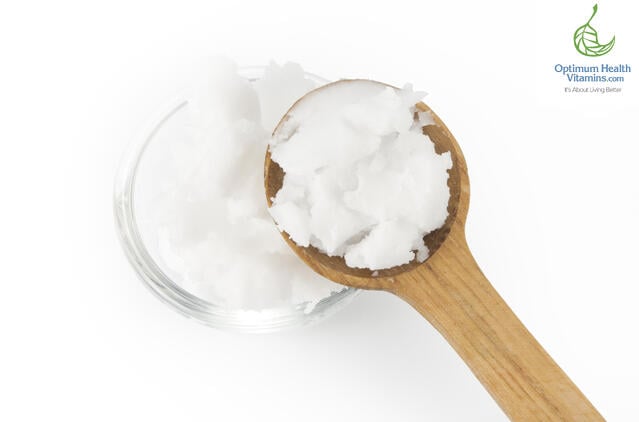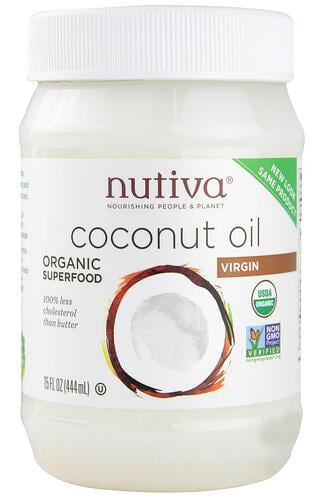
It may come as a surprise but coconut oil is actually healthy for you! In a society obsessed with eating everything low fat and low in saturated fats – this statement seems like an oxymoron. Yet research by biochemist and nutritionist, Dr. Mary Enig shows that our current North American diet is actually contributing to our obesity problem and also contributes to more illness (Enig & Fallon, 2006, p.5)!
 Many of us have been inundated with images of models that have become increasingly skinnier over the years and hear stories of how these models deprive themselves of food to achieve the latest fashion – starvation. However, “starving yourself is counterproductive, since it signals the body to hold on to fat” (Enig & Fallon, 2006, p.6). In fact “when you eat sufficient quantities of the right combinations of fats [people] will notice that [they] can go for hours without eating and without experiencing cravings because [their] bod[ies] are satisfied and [their] blood sugar is stable” (p. 6).
Many of us have been inundated with images of models that have become increasingly skinnier over the years and hear stories of how these models deprive themselves of food to achieve the latest fashion – starvation. However, “starving yourself is counterproductive, since it signals the body to hold on to fat” (Enig & Fallon, 2006, p.6). In fact “when you eat sufficient quantities of the right combinations of fats [people] will notice that [they] can go for hours without eating and without experiencing cravings because [their] bod[ies] are satisfied and [their] blood sugar is stable” (p. 6).
Related article: Cooking With Cold Pressed Virgin Coconut Oil.
What happens in our bodies when we ingest good fats and good amounts of fats like coconut oil is that a hormone is produced in the stomach and small intestine that tells our bodies that we’ve had enough (p.7) We are satiated, therefore the cravings for foods that contribute to weight gain are gone.
The reason coconut oil is the focus of Enig’s eat fat campaign is partly because “the body can use coconut oil for energy more rapidly and efficiently than any other fat source” (p.17). The medium-chain fatty acids (MCFAs) in coconut are not stored as fat in the body but rather are “converted to energy, making coconut ideal for weight loss” (p. 17).
Not only does coconut oil help losing weight, it also targets many health issues such as chronic fatigue, bacterial and viral infections, gall bladder ailments and thyroid imbalance (p. 14 & 15).
A study by study Dr. Harry Preuss of Georgetown University showed the healing power of coconut oil. “…lauric acid, which is present in heavy concentrations in coconut oil, forms monolaurin in the animal body and this derivative of lauric acid can inhibit the growth of many pathogenic microorganisms” (Preuss & Echard & Enig & Brook & Elliott, 2005, p.279-285). This is significant considering the growing concern about “superbugs” – pathogens immune to antibiotics.
Fallon asserted “The demonized saturated fats [including coconut oil]…are not the cause of our modern diseases. In fact they play many important roles in the body chemistry: …[they} constitute at least 50 percent of the cell membranes…they play a vital role in the health of our bones…the lower Lp(a) a substance in the blood that indicates proneness to heart disease…they enhance the immune system…[and they] have important antimicrobial properties…protect[ing] us against harmful microorganisms in the digestive tract” (Fallon, 2001, p. 11).
Saturated fats, including coconut oil, have also gotten a bad rap for contributing to heart disease and other health issues. However, contrary to all the advertising and so-called health messages we receive every day, studies have been done that show high-fat foods are not necessarily the main culprit behind heart disease.( Enig & Fallon, 2006p. 26) Fallon showed that many of the research studies done in regards to heart disease do not provide the most accurate data. “ While it is true that researchers have induced heart disease in some animals by giving them extremely large dosages of oxidized or rancid cholesterol – amounts ten times that found in the ordinary human diet – several population studies squarely contradict the cholesterol heart disease connection” (Fallon, 2001, p. 6).
One example is the Masai in Kenya who live mostly on milk, meat and blood and drink at least a gallon of milk per day. However, Dr. George Mann of Vanderbuilt University “discover[ed] the Masai to be virtually free of heart disease [and] their blood cholesterol was extremely low, about 50 percent lower than that of most Americans” (p.26).
Other studies show there is a possible correlation between less disease and the use of coconut oil. A report by the National Cancer Institute shows that “Thailand has one of the lowest cancer rates for both men and women out of the 50 countries studied” (p. 17). Thailand has the highest coconut consumption in the entire world (p. 17). Furthermore, none of the other countries in the survey consumed coconut on a regular basis.
In third world countries who have switched from their regular tropical oils such as coconut oil, to the supposedly healthier polyunsaturated vegetable oils, “the incidence of intestinal disorders and immune deficiency diseases has increased” (Fallon, 2001, p. 20). To me this indicates the North American obsession with a low fat diet is incredibly skewed.
It is time to take another look at coconut oil to see the wide range of health benefits it offers to our increasingly unhealthy North American society. It is time to “avoid all processed foods containing newfangled hydrogenated fats and polyunsaturated oils” (Fallon, 2001, p. 20). Eat fat, lose fat and be healthy.
Take care,
Myra

Myra is a Certified Holistic Health Practitioner and Reflexologist.
References:
Enig, M., Fallon, S. (2006). Eat fat lose fat. New York: Penguin Group.Enig, M.G.(2006). More good news on coconut oil. Retrieved November 9, 2008 from: http://www.westonaprice.org/knowyourfats/coconut-antimicrobial.html
Fallon, S. (2001). 2nd Ed. Nourishing traditions: the cookbook that challenges politically correct nutrition and the diet dictocrats. Washington, DC: New Trends Publishing. 4 – 20.
Preuss HG, Echard B, Enig M, Brook I, Elliott TB. Minimum inhibitory concentrations of herbal essential oils and monolaurin for gram-positive and gram-negative bacteria. Molecular Cell Biochemistry. 2005;272:29-34.
Preuss HG, Echard B, Dadgar A, Talpur N, Manohar V, Enig M, Bagchi D, Ingram C. Effects of Essential Oils and Monolaurin on Staphylococcus aureus: In Vitro and in Vivo Studies. Toxicology Mechanisms and Methods 2005;15:279-285
Disclaimer: The above information is provided for informational purposes only and is not intended to replace the advice of your physician.


